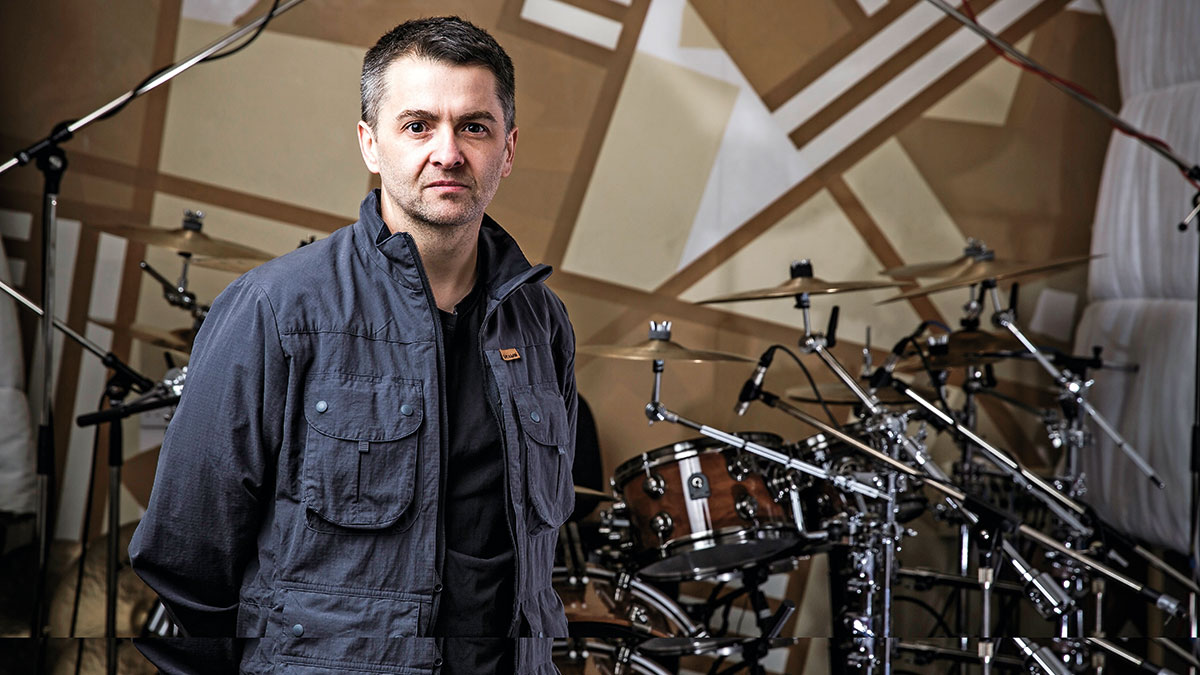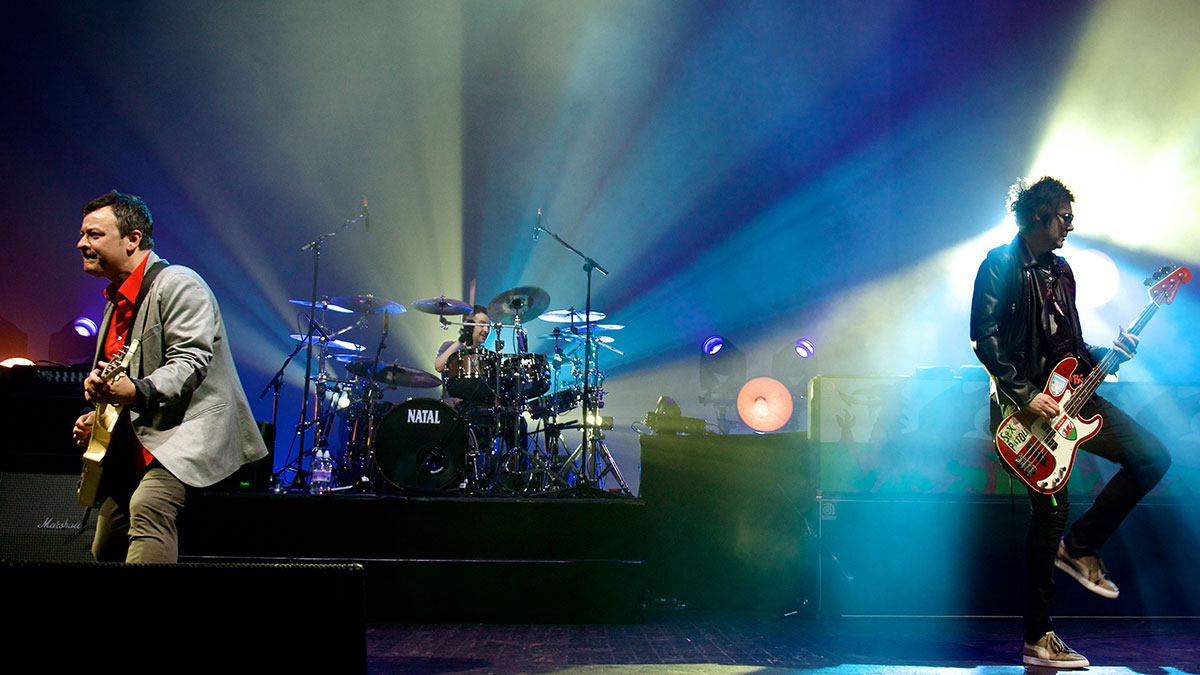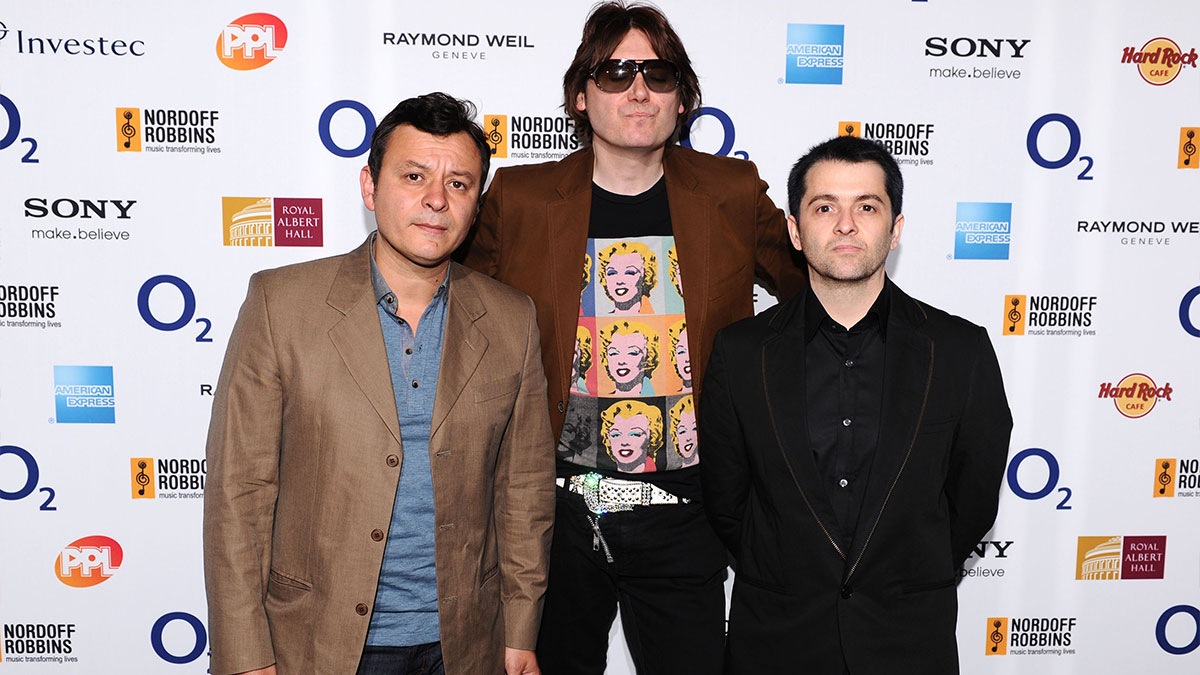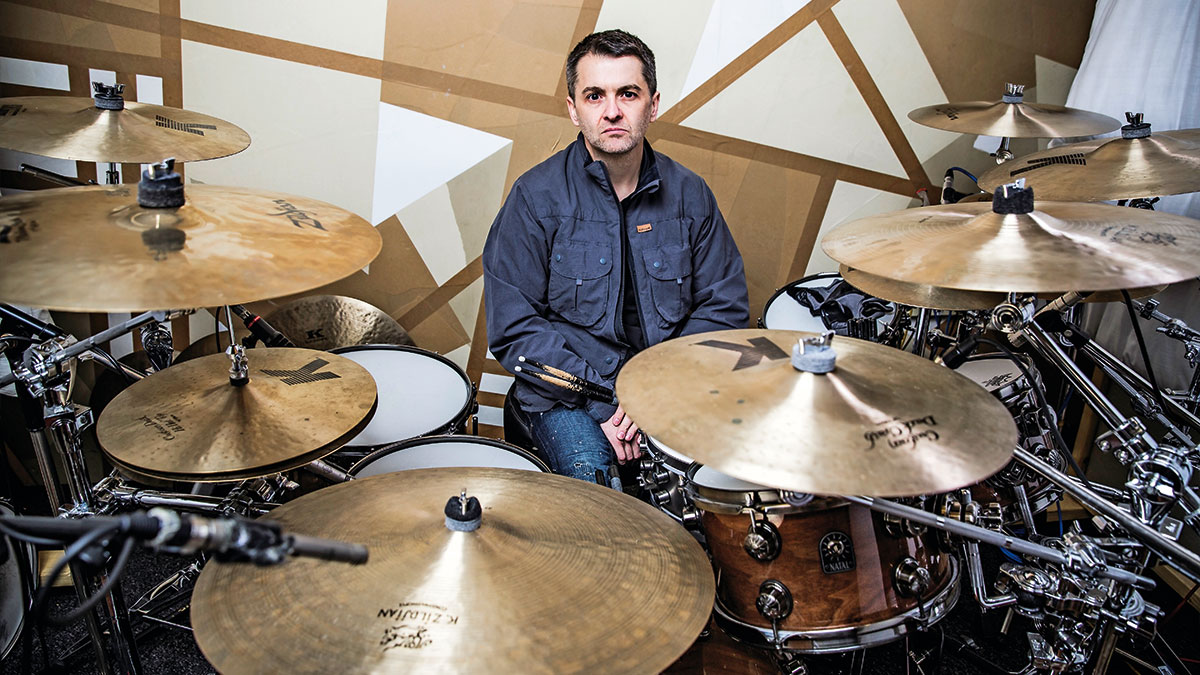Sean Moore on 30 years of ups and downs with Manic Street Preachers
Brit rock icon looks back on a career of hits

"My heroes were Charlie Watts and Ringo Starr, because I thought if they can do it anyone can."
Epochal Manic Street Preachers album Everything Must Go turns 20 this year. Released at the height of Britpop, it was a record that soundtracked those heady days in the ’90s yet stood a step apart from it all as the band’s hook-laden rock with its euphoric orchestration and socially and politically-charged lyrical themes delivered more than just ‘cigarettes and alcohol’.
The album bagged the Manics awards, fans and record sales by the bucketload, and stood as a sad testament to their troubled missing fourth member, Richey Edwards, who had disappeared without word or warning in 1995 after helping write much of the record.
For drummer Sean Moore, the album’s huge success was a recognition of the previous 10 years’ graft, as the band matured from hyped indie iconoclasts to out-of-step glam rockers to critically acclaimed stadium rockers over four albums – and reinvigorated the band just as they’d been staring into a career abyss following the lukewarm reception given to their dark, third album the Holy Bible.
Their success assured by Everything Must Go, Sean, his cousin and guitarist/vocalist James Dean Bradfield and bassist Nicky Wire went on to cement their success with This Is Your Truth in 1998, and remain much-loved arena headliners after 12 albums.
When did the Manics first come together properly?
“For me it was all about when we recorded our first single, Suicide Alley, and then it seemed like we were a proper band. We spent five days and £1,000, which was a lot of money back in 1988. Then it felt like we were a band. It was five days in a proper studio, with mics and tape, and we spent sleepless nights trying to put it together, and then when we sent off the masters and got back the vinyl it was like we’d achieved something – though looking back on it we hadn’t really! All we’d done was spend a load of money and had a little bit of a taste.
"We had a play on John Peel, I don’t think he particularly liked it but he played it because we’d achieved making a vinyl record and sent it in."
“Then it was a matter of finding our way through the door. We sent our seven-inch vinyls off to radio stations and A&R departments and journalists that we thought might have some affinity with what we were trying to do. We had a play on John Peel, I don’t think he particularly liked it but he played it because we’d achieved making a vinyl record and sent it in, and it opened the door then, people pricked up their ears.”
What was your approach to drums on those early recordings?
“The early days really it was more – then again it’s followed me all the way through – just playing to the vocal line and not trying to trash the melody, then just try to be as tasteful as possible.I was always constantly learning anyway, back then my heroes were Charlie Watts and Ringo Starr, because I thought if they can do it anyone can, and it was a sort of very punk rock approach to it.”

"We aspired to the Sex Pistols - so as long as we could be as good as them, we'd be quite happy."
When did you first realise that you had a special chemistry as a band?
“Probably with the fact that we all knew what direction we were going in and we all pretty much liked the same things, we were very focussed. It was just so easy, the fact that we could just sit down with a lyric and come up with a song almost instantly.
“It takes a bit longer now, but then we’ve written a lot more songs. But yeah we just had a vision, we wanted to escape, felt alienated, and we just wanted to get out there and express ourselves in the only way we knew, and for us that was music.”
Tell us a little about the sessions for the Manics’ first album Generation Terrorists.
“[Early single] You Love Us was a bit more ramshackle and had more of a punk ethos, it was more about the attitude and the aggression rather than the preciseness of recording – we weren’t too worried about that so long as we got across that we meant it.
"It was just so easy, the fact that we could just sit down with a lyric and come up with a song almost instantly."
“We aspired to the Sex Pistols – so as long as we could be as good as them, we’d be quite happy. then Appetite For Destruction happened. Nick was always into rock and heavy metal, like Saxon and Whitesnake, so he had one foot in the heavy metal world as we were dragging him into the post-punk world. Appetite For Destruction happened and James’ ears stood up and he was like, ‘I wanna be Slash!’ so we had to develop a whole LA rock way of doing things.
“We listened to bands like The Cult and the Love album, and we knew it was produced by Steve Brown, and we thought we could put the two together to get this UK-LA rock type sound, a la Def Leppard, which is why we went to Steve because he’d engineered with Mutt Lange.
“We were very naive studio-wise then, so our first encounter was recording Stay Beautiful which was a mish-mash of rock and punk. We took a little while doing it so Steve was like, ‘Well, if you want to do this double album you keep talking about, there’s no way we’re going to be able to do this unless we go down a different route.’ So we ended up programming a lot of Generation Terrorists.
“There’s a few tracks on it that I played but there’s a load of other stuff where we got a programmer in for our demos, then I sat on his shoulder one weekend and by the time he finished on the Sunday I’d ordered all the gear and started to do it myself.”
What did that teach you about your own drumming?
“It taught me to listen more and be a bit more precise. I didn’t feel particularly satisfied by it but I’d always had a fascination with computers since I was a kid so it didn’t feel totally alien to me.”

"It was all posturing! That's all it was, trying to make a mark."
Early on the band was as much about the slogans and posturing as the music...
“It was all posturing! That’s all it was, trying to make a mark, and we were punching well above our weight. We were trying to compete then with all those American bands that had probably spent 10 years of their youth getting to that point and we’d just spent two years, and I wouldn’t say that we felt inadequate, but when you start playing festivals and you’re up against all the American bands you realise how far away you are. We spent a long time trying to get up to speed.”
At the time you said you planned to sell 16 million records then split up after one album...
“If we’d sold, and even to this day, if we ever achieve selling 16 million albums then yeah, I’d hang up my gloves and my sticks, job done. So that still irks us, still annoys us that we haven’t got to that landmark!”
"If we ever achieve selling 16 million albums then yeah,I’d hang up my gloves and my sticks, job done."
Second album Gold Against The Soul was underrated at the time...
“We put a lot into it. It was eight weeks, it should have sounded good. we took a big chance using Dave Eringa who we’d met as an engineer on Motown Junk and You Love Us, we were scrambling around for a producer. Steve Brown was a name for us at the time and he took a good share of the budget, so we wanted to spend more on recording.
“We were still using tape, Dave’s thing was we want to get it in one take, we don’t want any edits – so we had the painstaking task of rehearsing and rehearsing to get every take up to speed so we could record it in one go. There’s a few programmed bits and loops that I did, that I played to, like on Roses in the Hospital. But it was more of a rock album, we understood what we needed and we had the experience then.”

"We got to a crossroads where, do we call it a day or do we carry on?"
Had Richey’s contribution become less over the course of those first three albums?
“No, I don’t think so, it was still lyrics and cheekbones. He didn’t really contribute that much in the studio, but he never pretended he was a guitarist, so his job was all about image and the artwork of the albums, the press releases and those sorts of things. Only post-Priory... we tried to give him the space, we didn’t put any pressure on him, but he felt he needed to be part of the band live.
“We said just come along if you want and sit on the bus, or just write lyrics and be inspired by that. We did two tours, one with Suede, one with Therapy? and i think it was difficult for him but he wanted to do it. So we were weary but we were aware. It was never a problem.”
"The fact that he disappeared without any inkling as to what happened, there was no note, we didn’t know his intentions apart from wanting to escape."
When Richey disappeared, it must have been tough to make that decision to carry on without him.
“That was a tough one, yeah, there was the element of not knowing where he was, or whether we could carry on, or whether we should carry on. The fact that he disappeared without any inkling as to what happened, there was no note, we didn’t know his intentions apart from wanting to escape. So we got to a crossroads where, do we call it a day or do we carry on?
“We’d already done some demos, prior to his disappearance, for the next album – we just thought we’d carry on the process of finishing the album, and who knows, maybe he’d turn up. We always had that in the back of our minds, that he might turn up, and we just carried on.”
Did the change in the band’s dynamic, without Richey, make a difference to the musical direction you were able to take?
“No I don’t think so, I think we were always heading in that direction. It wasn’t as though Richey listened to difficult music, he listened to the same stuff as the rest of us. He was a massive Bowie fan, he was a massive Echo & the Bunnymen fan, before that Joy Division, and the lyrics have always been pretty dark.
“Holy Bible, obviously that came to a bit of a head, but we were in a situation where we thought we were gonna be dropped anyway, so for us it was two fingers up to the world, we’re going to go out in a ball of fire with Holy Bible. That didn’t seem out of context with where we were collectively. Everything Must Go, the actual lyrics were things we were working on previously anyway. we were just carrying it on, really, in the vain hope that maybe he would turn up, whether he wanted to be part of the group or not.”

"We just embraced it and thought, Yeah, okay, if you've got your Britpop then we're cool Cymru..."
Tell us about the band’s mindset as you recorded Everything Must Go...
“The Holy Bible wasn’t a big commercial success, and after the disappearance we were just happy that we could carry on making music. So this time we got a name producer in, Mike Hedges who’d done Siouxsie and the Banshees. he said, ‘A Design For You need a jukebox hit!’ and the fact that we could just go off to France, to his studio, and escape from it all, we could forget the UK, we didn’t read the press, and just concentrate on music. We felt that we were pretty free then to do what we wanted.”
With the success of Everything Must Go, you became a part of the whole Britpop thing.
“We’ve always been out of step with the mainstream and we never felt we were a part of it. We were constantly reminded that we were Welsh and in the end we just embraced it and thought, Yeah, okay, if you’ve got your Britpop then we’re cool Cymru...”
"I always liked Kevin Carter, the way we mixed rock and bossa nova together, in a non-Santana way!"
You’re gearing up for a huge 20-year anniversary tour for Everything Must Go, what are your favourite tracks to play live from that album?
“A Design For Life obviously, I’ll get it right one day! If I could go back and re-record it I would, I would just put a little more dynamic into it. I always liked Kevin Carter, the way we mixed rock and bossa nova together, in a non-Santana way [laughs]! and obviously playing the trumpet on it! I love the Syncronicity Stewart Copeland ending on Kevin Carter; Australia, with the mad Keith Moon-esque fills.”
How did your relationship with Natal come about?
“I’d been using DW for a while, it’s always difficult when you’ve got a company based outside of the UK, especially in California, if you wanted to order anything it would take weeks. I just wanted to fly the flag more than anything for the UK, and there weren’t any real UK-based drums at the time, all the boutique drums came after, I think.
“Brian Downey had jumped on board so I thought, if it’s good enough for him! I was always fascinated by the sound of a walnut kit, being darker and a little bit more controlled and focussed. To be honest with you I haven’t stopped using it live or in the studio. They made me up a Vistalite copy in blue which I used for Rewind the Film [2013 Manics album] and which was a one-off, so I knew they were fully committed, and I haven’t looked back.”
How has your set-up changed over the years?
“It depends on the album but you end up adding things through necessity more than anything. It’s only in the last 10 years and with the Forever Delayed greatest hits tour we did, because of the amount of work then I ended up having to add extra bits. I’ve stuck with it rather than stripping it back, so what you see now is pretty much what it’ll be until we do an album where I need to add anything else.”